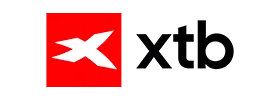The Czech Republic, a member of the European Union, offers a favorable environment for forex trading. With its stable economy and well-regulated financial markets, the country has become an attractive destination for traders and brokers alike. The Czech Republic’s strategic location in the heart of Europe, its highly developed infrastructure, and its skilled workforce make it an ideal hub for brokerage firms and other financial services providers.
Below you can find a list with the best Forex brokers regulated in Czech Republic:
Top 9 Forex Brokers in Czech Republic
-
Fusion Markets
- Australia regulated broker
- MT4, MT5, TradingView, Ctrader
- Leverage up to 500
Trading InstrumentsDeposit Methods- Commodities CFDs
- Crypto CFDs
- Forex CFDs
- Indices CFDs
- Metals CFDs
- Stock CFDs
-
FP Markets
- Australia and CySEC regulated broker
- MT4/MT5, TradingView, Ctrader, Iress
- EUR/USD spread from 0.0 pips
Trading InstrumentsDeposit Methods- Commodities CFDs
- Crypto CFDs
- Energy CFDs
- Forex CFDs
- Indices CFDs
- Metals CFDs
- Stock CFDs
-
ActivTrades
- Winner of 20+ Global Awards
- MT4/MT5, TradingView
- Leverage up to 1:400
Trading InstrumentsDeposit Methods- Bonds CFDs
- Commodities CFDs
- Crypto CFDs
- ETF CFDs
- Forex CFDs
- Indices CFDs
- Share CFDs
-
Plus500
- Multi-Level Regulated Broker
- Proprietary trading platforms
- Easy to use mobile app
Trading InstrumentsDeposit Methods- Commodities CFDs
- Crypto CFDs
- Energy CFDs
- ETF CFDs
- Forex CFDs
- Indices CFDs
- Metals CFDs
- Share CFDs
- Stock CFDs
- US Stock CFDs
-
XM Group
- XM provides great trading experiences using MetaTrader 4 and MetaTrader 5, which are improved by personalized features.
- Zero commission accounts are available
- Top-tier regulation from CySEC, ASIC, FSC, and DFSA oversee XM's operations, assuring transparency and client safety.
Trading InstrumentsDeposit Methods- Bonds CFDs
- Commodities CFDs
- Crypto CFDs
- Energy CFDs
- ETF CFDs
- Forex CFDs
- Forex Options
- Index Options
- Indices CFDs
- Metals CFDs
- Share CFDs
- Stock CFDs
- Stock Options
- US Stock Options
-
Pepperstone
- Australia and CySEC regulated broker
- MT4/MT5, TradingView, Ctrader, Iress
- EUR/USD spread from 0.0 pips
Trading InstrumentsDeposit Methods- Commodities CFDs
- Crypto CFDs
- Energy CFDs
- Forex CFDs
- Indices CFDs
- Metals CFDs
- Stock CFDs
-
eToro
- Popular broker for social trading
- Trading is conducted on innovative in-house platform
- Offers both investing and trading products
Trading InstrumentsDeposit Methods- Commodities CFDs
- Crypto CFDs
- ETF CFDs
- Forex CFDs
- Indices CFDs
- Metals CFDs
- Share CFDs
- Stock CFDs
- US Stock CFDs
-
BlackBull Markets
- Broker boasting lightning-fast execution speed
- ECN brokers with tight spreads from 0.0 pips
- $0 minimum deposit requirement
Trading InstrumentsDeposit Methods- Commodities CFDs
- Crypto CFDs
- Forex CFDs
- Indices CFDs
- Metals CFDs
- Stock CFDs
-
XTB
- XTB is a publicly traded company regulated by FCA and CySEC
- XTB's proprietary mobile app enables traders to trade from anywhere
- Commission-free stock trading with no platform fees and direct access to thousands of shares
Trading InstrumentsDeposit Methods- Commodities CFDs
- Crypto CFDs
- Energy CFDs
- ETF CFDs
- Forex CFDs
- Indices CFDs
- Metals CFDs
- Share CFDs
- Stock CFDs
- US Stock CFDs
Brokers Compared by Spread
| Brand | Commission per lot | |
|---|---|---|
| Fusion Markets | AVG 0.93 pips | $0 Classic Account, $4.50 round turn on Zero Account |
| FP Markets | AVG 1.2 pips | $0 Standard Account; $6 round turn on Pro Account |
| ActivTrades | AVG 0.5 pips | $0 |
| Plus500 | AVG 1.4 pips | $0 |
| XM Group | AVG 1.2 pips | $0 Ultra Low Micro and Ultra Low Standard Accounts; $3.50 per side XM Zero Account |
| Pepperstone | AVG 1.1 pips | $0 (Standard Account), $7 round-turn (Razor Account, TradingView, MT4, MT5), $6 round-turn (Razor Account, cTrader) |
| eToro | AVG 1 pips | $1 or $2 (stocks only) |
| BlackBull Markets | AVG 1 pips | $0 (ECN Standard Account), $6 round turn (ECN Prime Account), $4 round turn (ECN Institutional Account) |
| XTB | AVG 0.9 pips | $0 |
FX Brokers Deposit Method Comparison
| Brand | Minimum deposit | |
|---|---|---|
| Fusion Markets | $0 | |
| FP Markets | $50 (AU$100) | |
| ActivTrades | $0 | |
| Plus500 | $100 | |
| XM Group | $5 | |
| Pepperstone | $0 | |
| eToro | $50 or $100 based on country ($10 for the UK) | |
| BlackBull Markets | $0 (Standard)$2,000 (Prime)$20,000 (Institutional) | |
| XTB | $250 |
Brokers by Regulator
| Brand | Maximum leverage | |
|---|---|---|
| Fusion Markets | 1:500 (ASIC | Pro Account), 1:30 (ASIC | Retail Account), 1:500 (VFSC | Retail Account) | |
| FP Markets | 1:500 (CySEC | Pro Account), 1:30 (ASIC | Retail Account), 1:30 (CySEC | Retail Account), 1:500 (FSAS | Retail Account) | |
| ActivTrades | 1:400 (CMVM | Pro Account), 1:30 (CMVM | Retail Account), 1:1000 (FSC), 1:200 (SCB) | |
| Plus500 | 1:300 (Pro Account), 1:30 (ASIC | Retail Account), 1:30 (BaFin | Retail Account), 1:30 (CySEC | Retail Account), 1:30 (FCA | Retail Account), 1:30 (FMA | Retail Account), 1:30 (SFSA | Retail Account), 1:30 (DFSA), 1:300 (FSAS), 1:20 (MAS), 1:300 (SCB) | |
| XM Group | 1:30 (CySEC | Retail Account), 1:1000 (IFSC | Retail Account) | |
| Pepperstone | 1:500 (CySEC | Pro Account), 1:500 (SCB | Pro Account), 1:30 (ASIC | Retail Account), 1:30 (CySEC | Retail Account), 1:30 (DFSA | Retail Account), 1:30 (FCA | Retail Account), 1:200 (SCB | Retail Account) | |
| eToro | 1:400 (CySEC | Pro Account), 1:30 (CySEC | Retail Account), 1:400 (FSAS | Retail Account) | |
| BlackBull Markets | 1:500 (FMA), 1:500 (FSAS) | |
| XTB | 1:200 (CySEC | Pro Account), 1:30 (CySEC | Retail Account), 1:30 (FCA | Retail Account), 1:500 (IFSC | Retail Account) |
Forex Brokers Platform Availability
| Brand | FX pairs to trade | |
|---|---|---|
| Fusion Markets | cTrader, MetaTrader 4, MetaTrader 5, TradingView | |
| FP Markets | cTrader, TradingView | |
| ActivTrades | MetaTrader 4, MetaTrader 5, Proprietary Web, TradingView | |
| Plus500 | Proprietary Mobile, Proprietary Web | |
| XM Group | MetaTrader 4, MetaTrader 4 MultiTerminal, MetaTrader 5, Proprietary Mobile, Proprietary Web | |
| Pepperstone | MetaTrader 4, MetaTrader 5, Proprietary Mobile, Proprietary Web | |
| eToro | Proprietary | |
| BlackBull Markets | cTrader, MetaTrader 4, MetaTrader 5, TradingView | |
| XTB | Proprietary |
Comprehensive Comparison of the Best Czech Republic Forex Brokers
As a result, the Czech Republic has seen a significant growth in the number of forex traders and brokers in recent years. Continue reading as we provide an overview of forex trading in the country, including the legal framework, regulatory requirements, and tax implications, to help traders and investors navigate the market and make informed decisions.
Legal Forms of Forex Trading in the Czech Republic
Forex trading is legal in the Czech Republic, but only when conducted with brokers licensed by the Czech National Bank (CNB) or other EU regulators like CySEC or BaFin. The country’s forex market is governed by the Act on Capital Market Undertakings (Act No. 256/2004) and the Act on Management Companies and Investment Funds (Act No. 240/2013).
These laws regulate various aspects of forex trading, including spot trading and derivatives like the contracts for difference (CFDs). The CNB, as the primary regulator, oversees the activities of forex brokers and ensures compliance with local and EU regulations, such as the Markets in Financial Instruments Directive (MiFID II).
Forex spot trading, which involves buying and selling currency pairs at current market prices, is a popular form of trading in the Czech Republic. It entails ownership of the actual underlying assets and an almost immediate settlement of transactions. Additionally, derivatives like CFDs, futures, and options are also available, providing local traders with access to leverage and expanding their investment opportunities.
- CFDs (Contract for Difference): This is a contract between a trader and a broker, where the former agrees to exchange the difference in value of a currency pair between the time the contract is opened and the time it is closed. CFDs allow traders to speculate on the price movement of a currency pair without actually owning the underlying currencies. For example, a trader can open a long position in the EUR/USD pair, if they believe the euro’s value will appreciate against the US dollar.
- Options: A forex option is a contract that gives the trader the right, but not the obligation, to buy or sell a currency pair at a predetermined price (strike price) on or before a certain date (expiration date). Options can be used for the purposes of risk management as a hedge against potential losses. For example, a trader can buy a call option on the EUR/USD currency pair and purchase euros with dollars at a specific price but only on condition the market rises above that level.
- Futures: A forex future is a contract that obligates the trader to buy or sell a currency pair at a given price on a prearranged date. Unlike options, futures contracts are binding, meaning that the trader must fulfill their obligation on the specified date.
These derivatives offer Czech traders a range of portfolio diversification opportunities, but they also come with unique risks and complexities. The CNB strictly regulates their provision to ensure they are traded transparently, and that Czech residents are protected from unethical practices.
Restrictions on Currency Trading in the Czech Republic
The Czech National Bank has introduced certain restrictions on currency trading to protect retail customers. One prominent example is the mandatory ceiling on the maximum leverage available to retail clients. Leverage enables traders to control larger positions with smaller initial deposits. While this can amplify one’s potential gains, it also increases the risk of suffering significant losses.
- Forex Leverage Caps
Like all EU financial regulators, the Czech National Bank has capped the retail leverage at 1:30 for major currency pairs like EUR/USD, USD/JPY, and GBP/USD and 1:20 for minor pairs like EUR/JPY and GBP/JPY. By contrast, professional traders can leverage their positions in major pairs at ratios reaching 1:400 or even 1:500 at some brokers.
These leverage caps are in place to protect retail clients from taking on excessive risks. High leverage can lead to significant losses, especially for inexperienced traders who may not fully understand the risks involved. By capping the leverage, the CNB aims to reduce the risk of traders losing more than they can afford, and to promote a more responsible and sustainable approach to forex trading.
- Forex Binary Options Restrictions
Additionally, the CNB banned licensed brokers from offering binary options to retail traders in 2018, citing concerns about the high risk this financial instrument involves. Binary options entail betting on the price movement of an underlying asset, such as a currency pair. They resemble gambling in that the trader earns a fixed payout upon making a correct prediction about short-term price fluctuations. For example, you may think the price of the EUR/USD would decline dramatically in the next five minutes and incur a loss if it doesn’t.
Who Regulates Forex Trading in the Czech Republic?
The Czech National Bank (CNB) is the primary regulator of forex trading in the Czech Republic. It was established under Act No. 6/1993, which was adopted by the Czech National Council in December 1992, but came into effect in early January 1993. This law defines the CNB’s role, responsibilities, and powers and establishes it as an independent institution, responsible for maintaining price stability, supervising the local financial system, and preserving the integrity of the financial sector.
The CNB’s regulatory responsibilities include licensing and supervising forex brokers, monitoring market activities, and enforcing compliance with the relevant legislation. Since the Czech Republic is a member of the European Union, the CNB has also adopted the EU’s regulatory framework, which allows for cross-border passporting under MiFID. This means that forex brokers licensed in other EU countries can operate in the Czech Republic without necessarily obtaining a separate license from the CNB, and vice versa.
Requirements for Forex Brokers in the Czech Republic
Brokers must satisfy certain conditions to obtain a forex license in the Czech Republic. These include meeting minimum capital requirements ranging from €125,000 to €730,000, having a physical presence in the country, and employing qualified and vetted personnel. Additionally, licensees must comply with various consumer protection requirements, such as offering negative balance protection to retail clients and contributing to investor compensation funds.
Negative balance protection ensures that traders cannot lose more than their initial investment. Rapidly losing leveraged positions are automatically closed to prevent the client from running up debt. On the other hand, investor compensation serves as a safeguard in case of broker insolvency. Under EU regulations, each retail trader is entitled to a compensation of up to €20,000 if their broker declares bankruptcy.
Price transparency requires brokers to disclose their pricing policies and order execution practices. Brokers must also segregate client funds, which means customer money is kept separate from the broker’s own capital. Forex brokers must also comply with the CNB’s rules on risk management, auditing, and reporting.
Are There Taxes on Profits from Forex Trading in the Czech Republic?
Profits derived from forex trading are subject to taxation in the Czech Republic. The personal income tax rate is 15% for individuals and is levied on the net profit of traders. The rate may vary depending on the individual’s tax status and other factors. It is essential for traders to consult with a tax professional to ensure compliance with the country’s tax laws and regulations. The Czech Republic has a relatively favorable environment for forex traders, with low tax rates and a straightforward taxation system.
How to Identify Reliable Forex Brokers Accepting Czech Clients
To identify reliable forex brokers, Czech traders should look for several key factors, starting with the license from the CNB or another EU regulator, such as CySEC, AMF, CBI, or BaFin. This ensures that the broker is subject to stringent regulatory oversight and offers adequate consumer protections.
We recommend you search the register of licensed brokers on the CNB’s website to verify the broker’s license and regulatory status. The Czech regulator maintains a database where you can find all authorized entities operating in the country. Another option is to contact the regulator directly by calling over the phone (+420 224 411 111). Alternatively, you can check the register of the European Securities and Markets Authority (ESMA) if your chosen broker operates in the Czech Republic through EU passporting.
Traders should ensure the broker is transparent about their prices by checking its pricing model and execution policies. All trading costs should be clearly outlined without any hidden fees. Traders should research the broker’s reputation, read consumer reviews online, and check for any warnings or fines issued by the competent regulatory authorities. By taking these steps, you increase your chances of finding a trustworthy forex broker in the Czech Republic.
FAQ
Can I trade with a Czech-friendly broker licensed in another EU country?
Yes, you can trade with a broker licensed in another EU country. Due to the European Union’s passporting rules, brokers licensed in the EU and EEA can provide their services to clients in the Czech Republic, without needing a separate license from the CNB. A company authorized by CySEC, for example, can service Czech clients as long as it complies with EU and CNB requirements.
What other financial markets are available at Czech-friendly forex brokers?
You can trade commodities like gold, oil, and natural gas, or indices like the Euro Stoxx 50. Many brokers also offer trading in individual stocks, including those listed on the Prague Stock Exchange (PX). In most instances, Czech customers gain access to the cryptocurrency markets as well where they can trade CFDs on popular cryptocurrencies like Bitcoin, Ethereum, or Litecoin. Some brokers may also offer trading in bonds, ETFs, or options, providing a diverse range of investment opportunities for Czech traders.
Are there minimum deposit requirements at Czech forex brokers?
Some Czech forex brokers have minimum deposit requirements, which can vary depending on the broker and the type of account. Minimum deposits range from €50 to €1,000, although some brokerages may offer micro accounts with lower or no minimum requirements. It’s essential to check the specific minimums for each broker and account type, as well as any associated fees or conditions, to ensure that you find a broker that meets your investment needs and budget.
Can I open a live forex account in CZK?
Yes, many Czech-friendly brokers give you the option to open a live forex account in the Czech koruna (CZK), allowing you to deposit, trade, and withdraw funds in your local currency. This can be convenient for Czech traders, as it eliminates the need to convert funds to other currencies and helps them avoid additional conversion fees.
How can I qualify for a professional forex trading account with a Czech-friendly broker?
ESMA requires that brokers classify clients as professionals if they meet at least two of the following conditions: (1) they have carried out transactions in significant sizes (at least 10 trades per quarter) on the relevant market at an average frequency of at least one per quarter, (2) they have a financial portfolio exceeding €500,000, or (3) they work or have worked in the financial sector for at least one year in a professional position.
Why You Should Trust RationalFX
When it comes to making informed decisions about forex brokers, it's essential to rely on trustworthy sources. RationalFX, a company with over 20 years of experience since its founding in 2005, has established itself as a credible authority in the industry. With an impressive collection of over 2500 reviews on Trustpilot, boasting a score of 4.2, it's clear that Rational FX has built a reputation for providing reliable and unbiased information.
What sets Rational FX apart is its rigorous evaluation process, which considers over 30 different criteria when selecting forex brokers. This comprehensive approach ensures that every aspect of a broker's service is taken in consideration, including regulation, forex spreads, trading platforms, deposit methods, and reputation. With its wealth of experience, transparent review process, and outstanding customer feedback, Rational FX is a trusted source for anyone seeking reliable information on forex brokers. You can reach us via e-mail at feedback@rationalfx.com or contact us through our social media accounts here: Facebook, YouTube, or leave a feedback here.














